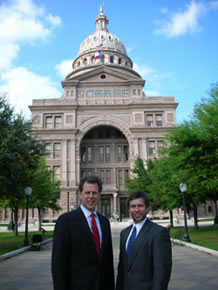|
Download the Media Review | JW in the News | 100 Years of History
Paul Watler
The Texas Free Flow of Information Act was signed into law Wednesday by Governor Rick Perry. The FFOIA creates a qualified privilege for journalists in both civil and criminal proceedings against the compelled disclosure of confidential news sources and non-published work product. 
JW partners Paul Watler (left) and Bob Latham, after testifying at the State Capitol in support of the reporters' shield law
The legislation is the culmination of efforts by leaders of the Texas media spanning more than two decades in which Jackson Walker attorneys played key roles. The bill became effective immediately upon the governor's signing. With the 81st Legislature's enactment of HB 670, Texas joins 36 other states and the District of Columbia in safeguarding the free flow of information to the public by protecting the rights of sources to provide information and the rights of journalists to gather and communicate the news without unwarranted intrusion. Under the bill in civil cases, the journalist's privilege could be overcome only in narrow circumstances. The statute requires a clear and specific showing that alternative sources have been exhausted, that the subpoena is not overly broad, that reasonable notice was provided to the journalist, that the interest in disclosure outweighs the public interest in news gathering and reporting, and that the information is essential to the proceeding. In criminal cases, the Texas shield law includes limited exceptions involving a journalist as an eyewitness to a felony, a person confessing a felony to a journalist, where probable cause exists that a confidential source committed a felony and the prosecutor has exhausted all efforts to obtain the source's identity, or if disclosure is necessary to prevent certain death or substantial bodily harm. The bill also relaxes evidentiary requirements for proving the authenticity of broadcast tapes. By making it simpler for civil and criminal litigants to prove-up broadcast material, there will be an incentive not to disturb confidential source relationships. The bill's Senate sponsor, Senator Rodney Ellis (D-Houston), led efforts over the past three legislative sessions to enact the bill. Rep. Troy Martinez Fischer (D-San Antonio) spearheaded efforts in the House this session as sponsor. Rep. Todd Hunter (R-Corpus Christi), chair of the Judiciary Committee, fostered key meetings between media representatives and prosecutors to forge a compromise that ended organized opposition to the bill.
"At long last, the day has arrived when Texas journalists know that they have legal protection in working with confidential sources." Partners in Jackson Walker's media practice, including Chip Babcock, Paul Watler, and Bob Latham, have assisted the legislative efforts for years. Over several legislative sessions, the three JW attorneys worked with the Texas Association of Broadcasters, the Texas Daily Newspaper Association, and others to provide testimony, craft language, plan strategy, and persuade members of the Legislature. "At long last, the day has arrived when Texas journalists know that they have legal protection in working with confidential sources," said Watler. "Texas news organizations have a rich history of exposing public corruption and wrongdoing. This bill will go a long way in making sure that tradition survives far into the future." Watler specifically referenced the exposure of the Texas Youth Commission scandal by Jackson Walker client The Dallas Morning News in 2007, the "fake drugs" scandal uncovered by JW client WFAA-TV in 2002, and the Firestone tire recall reported by KHOU-TV in 2000 (owned by JW client Belo Corp.) — all essential journalistic efforts that served the citizens of Texas. — Paul Watler is a partner at Jackson Walker. He can be reached at pwatler@jw.com. |





